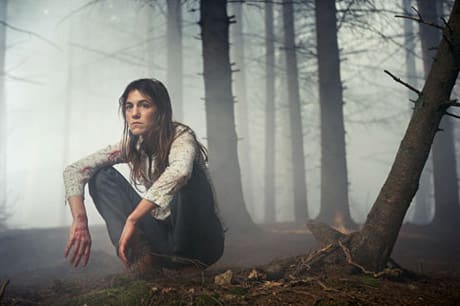By now, many have likely heard of the controversy surrounding Lars von Trier's latest misanthropic epic, what with its vivid depiction of genital and animal mutilation, and possible misogynist subtext. And it's warranted, as early scenes of a frolicking deer with a dead fawn hanging from its vagina only give way to talking foxes and bodily horrors. But strangely enough, this shock seems warranted and serves a purpose — well, mostly.
Following the death of their son, a woman (Charlotte Gainsbourg) suffers intense grief (or pain, or despair), eventually requiring hospitalization and a medicinal cocktail, which her husband (Willem Dafoe) rejects, feeling that he, as a therapist, knows better than the doctor. He proceeds to coolly treat his wife's depression, forcing her to face her greatest fears, quite literally, by taking her to a cabin where she spent time alone with her son while studying gynocide.
If taken literally, Antichrist suggests that women, as controlled by nature as vessels for life, are inherently evil for creating putrid spawn in a grotesque world meant only for suffering. From the monochromatic opening of the couple fornicating while their son falls to his death, the film preoccupies itself with sexuality, equating the constant need for sex as instinct and escape to the constant, and pointless, falling of acorns from oak trees.
While this perceived narrative blame does indeed lead to some grossly misogynist didactics, deliberate shifts in perspective throughout the film suggest more than gender politics, as typically we see symbols and distortions through the eyes of the man. The woman passively acknowledges her husband's solipsism, knowing him incapable of emotion or deeper understanding, and his attempts to understand her, through her research, almost immediately lead to unexplained rage and violence, which we're not invited to understand on a literal level.
More succinctly, there is more going on than the damnation of women, and while some of the symbolism can be unintentionally amusing, it would be hard to deny the overall sense of unease and emotional complexity throughout the film.
From the visuals to the soundtrack and performances, there is much that impresses, even if some of the static gratuity perhaps takes it too far. It would also be hard to recommend this film to anyone not looking to punish themselves.
(E1)Following the death of their son, a woman (Charlotte Gainsbourg) suffers intense grief (or pain, or despair), eventually requiring hospitalization and a medicinal cocktail, which her husband (Willem Dafoe) rejects, feeling that he, as a therapist, knows better than the doctor. He proceeds to coolly treat his wife's depression, forcing her to face her greatest fears, quite literally, by taking her to a cabin where she spent time alone with her son while studying gynocide.
If taken literally, Antichrist suggests that women, as controlled by nature as vessels for life, are inherently evil for creating putrid spawn in a grotesque world meant only for suffering. From the monochromatic opening of the couple fornicating while their son falls to his death, the film preoccupies itself with sexuality, equating the constant need for sex as instinct and escape to the constant, and pointless, falling of acorns from oak trees.
While this perceived narrative blame does indeed lead to some grossly misogynist didactics, deliberate shifts in perspective throughout the film suggest more than gender politics, as typically we see symbols and distortions through the eyes of the man. The woman passively acknowledges her husband's solipsism, knowing him incapable of emotion or deeper understanding, and his attempts to understand her, through her research, almost immediately lead to unexplained rage and violence, which we're not invited to understand on a literal level.
More succinctly, there is more going on than the damnation of women, and while some of the symbolism can be unintentionally amusing, it would be hard to deny the overall sense of unease and emotional complexity throughout the film.
From the visuals to the soundtrack and performances, there is much that impresses, even if some of the static gratuity perhaps takes it too far. It would also be hard to recommend this film to anyone not looking to punish themselves.
